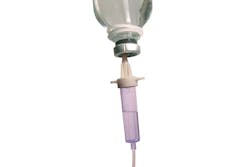Medical devices vulnerable to hackers warns FDA
For hospitals, devices such as IV pumps, ventilators, MRI, CAT Scan and X-Ray machines are increasingly being attached to the facility’s networks. An obvious benefit of this would be the easy transfer of test results to electronic medical records (ERM) systems; however, the Food & Drug Administration (FDA) is now warning these providers that as medical devices are increasingly interconnected via the Internet and hospital networks, they are now extremely vulnerable to cybersecurity breaches.
In a recent safety alert, the FDA has officially outlined these potential vulnerabilities and incidents that could directly impact medical devices or hospital network operations, including:
• Network-connected medical devices infected or disabled by malware;
• The presence of malware on hospital computers, smartphones and tablets, targeting mobile devices using wireless technology to access patient data, monitoring systems, and implanted patient devices;
• Uncontrolled distribution of passwords, disabled passwords, hard-coded passwords for software intended for privileged device access (e.g., to administrative or maintenance personnel);
• Failure to provide timely security software updates and patches to medical devices and networks and to address related vulnerabilities in older medical device models (legacy devices);
• Security vulnerabilities in off-the-shelf software designed to prevent unauthorized device or network access, such as plain-text or no authentication, hard-coded passwords, documented service accounts in service manuals, and poor coding/SQL injection.
“The FDA is not aware of any patient injuries or deaths associated with these incidents, nor do we have any indication that any specific devices or systems in clinical use have been purposely targeted at this time,” the statement reads. “The FDA has been working with other agencies and manufacturers to identify, communicate and mitigate vulnerabilities as they are identified.”
The FDA expects medical device manufacturers to take appropriate steps to limit the opportunities for unauthorized access to medical devices. The extent to which security controls are needed will depend on the medical device, its environment of use, the type and probability of the risks to which it is exposed, and the probable risks to patients from a security breach.
But for healthcare facilities and providers, FDA recommends the following:
1. Restrict unauthorized access to the network and networked medical devices.
2. Make certain that appropriate antivirus software and firewalls are up-to-date. Monitor network activity for unauthorized use.
3. Protect individual network components through routine and periodic evaluation, including updating security patches and disabling all unnecessary ports and services.
4. Contact the specific device manufacturer if you think you may have a cybersecurity problem related to a medical device. If you are unable to determine the manufacturer or cannot contact the manufacturer, the FDA and DHS ICS-CERT may be able to assist in vulnerability reporting and resolution.
5. Develop and evaluate strategies to maintain critical functionality during adverse conditions.
About the Author
Paul Rothman
Editor-in-Chief/Security Business
Paul Rothman is Editor-in-Chief of Security Business magazine. Email him your comments and questions at [email protected]. Access the current issue, full archives and apply for a free subscription at www.securitybusinessmag.com.

